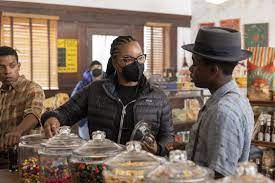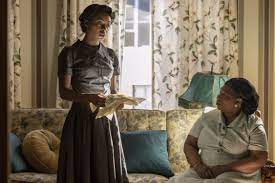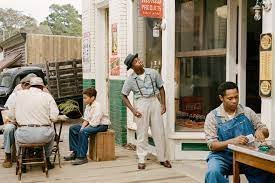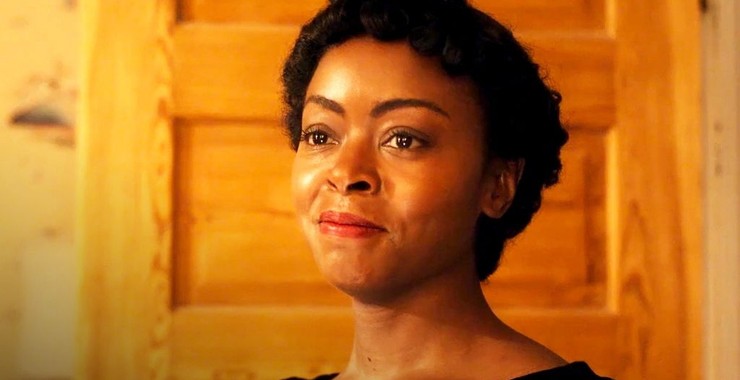
Emmett’s mother, Mamie Till-Mobley, made her 14 year old Chicago boy, brutally lynched in 1955 Mississippi, into an important landmark on the road toward Civil Rights legislation in the U.S.
Danielle Deadwyler (The Harder They Fall) totally embodies the mother whose love, fear for her son, and utter anguish turned into the activism that made her son a symbol that gave her life purpose that continues to this day. Deadwyler makes this role her own and the one that surely catapults her in major roles to come.
Writer/Director Chinonye Chukwu (Clemency) creates a 1955 era that is accurately reminiscent of the period: two distinct Americas. Chicago, with its shiny cars, big department stores and more formal and fashionable attire is contrasted with the cotton fields, dirt roads and general stores of the South. Where the racism of Chicago is under-the-radar, the script, written by Chukwu, Michael Reilly and Keith Beauchamp, pulls no punches when it comes to what life was like for Black people in rural Mississippi. The script paints the White racists in Mississippi with a two-dimensional brush. There is no effort to give them any depth. They’re portrayed as nothing more than blind haters.



Chukwu (Clemency) creates a 1955 era that is accurately reminiscent of the period: two distinct Americas. Chicago, with its shiny cars, big department stores and more formal and fashionable attire is contrasted with the cotton fields, dirt roads and general stores of the South. Where the racism of Chicago is under-the-radar, the script, written by Chukwu, Michael Reilly and Keith Beauchamp, pulls no punches when it comes to what life was like for Black people in rural Mississippi. The script paints the White racists in Mississippi with a two-dimensional brush. There is no effort to give them any depth. They’re portrayed as nothing more than blind haters.
Jalyn Hall captures the naive, cheerful, upbeat young teen who thinks he’s invincible. So innocent, he never imagined that whistling at a White woman in Mississippi would lead to such mortal consequences. Deadwyler was raised in Atlanta and is considered a scholar in African American and Women’s studies. She was so committed to this project, she had her own son stand in for Jalyn until Hall was cast in the role. As Mamie, her face projects with serious fear what a young boy could encounter for an innocent gesture.
Whoopi Goldberg is underused as Mamie’s Mom, Alma. She is almost unrecognizable at first in makeup and wearing a housedress. She has one good line in the film that shows parents fear for their children through all generations.
Director Chinonye Chukwu chose to spare the audience scenes showing us the extreme brutality as it was been inflicted on Emmett, which leaves even more horror to the imagination. You do get to see the result. The most dramatic shot of the movie is the moment when Mamie is told her son is dead. Chukwu has his cinematographer Bobby Bukowski perform a dolly zoom on Mamie. As the camera dollies back, the camera zooms in on her face showing the growing shocking realization and grief of the moment until she is completely overcome. Deadwyler is exquisite as you see her turn her grief into activism forcing the world to see her son’s mangled and bloated body so they can see for themselves what hatred has done. She goes to Mississippi to fight to have her son’s body returned to Chicago to for public viewing.



Music plays a large role in helping tell the story, place the audience in the time of the events and create the emotional atmosphere that defines the experience.The movie begins with Mamie and Emmett lip synching a pop tune along with the car radio. She has a phonograph in her bedroom always at the ready to play tunes that bring back those sweeter memories of being with her son. Composer Abel Korzeniowski uses the pop music and blends in minor chords of ominous strains to clearly point to the tragedy and pain on the horizon.
The film is slow with many pregnant pauses, some of which help the audience digest what Mamie wants understood, but sometimes those pauses elongate scenes that, if tightened, could have helped the pace and shortened the long length of the film.
Director Chinonye Chukwu shows that the work Mamie started in the 1950’s didn’t bear fruit until this year, with the passage and signing of the Emmett Till Anti-Lynching act. Chukwu’s filmmaking is a forceful and effective presentation of the historical racial divide that hasn’t changed enough. Deadwyler is impressive and her dedication and eloquence in this role does justice to Chukwu’s script and to the memory of Emmett Till.
United Artists Releasing 2 Hours 10 Minutes PG-13









